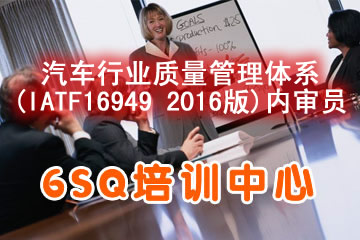[转帖].What Is QS-9000?
I. What Is QS-9000?
QS-9000 is the name given to the Quality System Requirements of the automotive industry which were developed by Chrysler, Ford, General Motors and major truck manufacturers and issued in 1994. QS-9000 is sometimes seen as being identical to ISO 9000. However, QS-9000 adds clauses to many of the ISO 9000 elements
QS-9000 will help companies to stay ahead of their competition. It will do this by filling gaps in the business and quality systems that can cause problems. QS-9000 eliminates redundant and unnecessary work practices. QS-9000 tells current and potential customers that the product has consistent quality and is manufactured under controlled conditions. This system is globally accepted as proof of quality in the automotive industry and is also a major customer requirement.
How Does QS-9000 Differ From ISO-9000?
QS-9000 is sometimes seen as being identical to ISO 9000, but this is not true. Even though each element of ISO 9000 is an element of QS-9000, QS-9000 adds clauses to the majority of the ISO 9000 elements. For example, QS-9000 adds requirements for a business plan, tracking customer satisfaction and bench marking to element 4.1 of ISO 9000, Management Responsibility. QS-9000 also uses sector-specific requirements. The following requirements are not based on ISO 9000:
· production part approval process
· the requirements for gaining approval from the customer to run a new or altered part or process
· continuous improvement
· automotive suppliers are required to have systems in place to ensure that organized, measurable improvement activities take place for a variety for business aspects
· manufacturing capabilities
· requirements for planning and effectiveness for equipment, facilities and processes
· requirements for mistake proofing, and tooling management.
QS-9000 Quality Statement
The QS-9000 Quality Statement tells of your company's objectives for quality and commitment to quality, and is relevant to company goals and customer needs and expectations. The Quality Statement will be given to all associates in the form of a laminated card that they must keep with them at all times. The Quality Statement should be posted in all areas of the facility. Though it is not necessary for each associate to memorize the quality policy statement, they should be able to read it from the card or wall and tell what it means to them. All management personnel must know the quality policy statement.
· Conclusion
QS-9000 was developed to ensure customer satisfaction beginning with conformance to fundamental quality requirements and utilizing such concepts as continuous improvement, defect prevention, and the reduction of variation and waste in the supply chain. QS-9000 is an expansion or adaption of ISO-9000 that is more comprehensive and more applicable to the automobile industry and its suppliers.
QS-9000 is the name given to the Quality System Requirements of the automotive industry which were developed by Chrysler, Ford, General Motors and major truck manufacturers and issued in 1994. QS-9000 is sometimes seen as being identical to ISO 9000. However, QS-9000 adds clauses to many of the ISO 9000 elements
QS-9000 will help companies to stay ahead of their competition. It will do this by filling gaps in the business and quality systems that can cause problems. QS-9000 eliminates redundant and unnecessary work practices. QS-9000 tells current and potential customers that the product has consistent quality and is manufactured under controlled conditions. This system is globally accepted as proof of quality in the automotive industry and is also a major customer requirement.
How Does QS-9000 Differ From ISO-9000?
QS-9000 is sometimes seen as being identical to ISO 9000, but this is not true. Even though each element of ISO 9000 is an element of QS-9000, QS-9000 adds clauses to the majority of the ISO 9000 elements. For example, QS-9000 adds requirements for a business plan, tracking customer satisfaction and bench marking to element 4.1 of ISO 9000, Management Responsibility. QS-9000 also uses sector-specific requirements. The following requirements are not based on ISO 9000:
· production part approval process
· the requirements for gaining approval from the customer to run a new or altered part or process
· continuous improvement
· automotive suppliers are required to have systems in place to ensure that organized, measurable improvement activities take place for a variety for business aspects
· manufacturing capabilities
· requirements for planning and effectiveness for equipment, facilities and processes
· requirements for mistake proofing, and tooling management.
QS-9000 Quality Statement
The QS-9000 Quality Statement tells of your company's objectives for quality and commitment to quality, and is relevant to company goals and customer needs and expectations. The Quality Statement will be given to all associates in the form of a laminated card that they must keep with them at all times. The Quality Statement should be posted in all areas of the facility. Though it is not necessary for each associate to memorize the quality policy statement, they should be able to read it from the card or wall and tell what it means to them. All management personnel must know the quality policy statement.
· Conclusion
QS-9000 was developed to ensure customer satisfaction beginning with conformance to fundamental quality requirements and utilizing such concepts as continuous improvement, defect prevention, and the reduction of variation and waste in the supply chain. QS-9000 is an expansion or adaption of ISO-9000 that is more comprehensive and more applicable to the automobile industry and its suppliers.
没有找到相关结果
已邀请:





2 个回复
biotop (威望:0)
赞同来自: